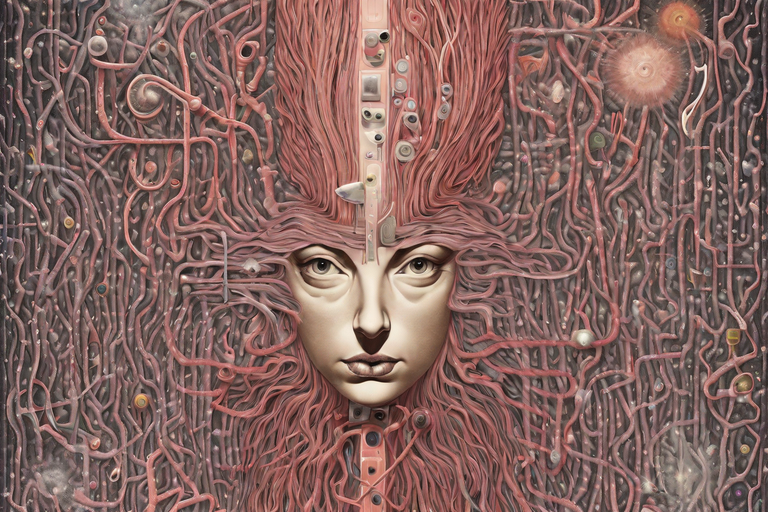What closes down reality for us the whole time are our expectations of it. We cling to these expectations continuously without hardly ever letting up and we cling so determinedly, so persistently, so automatically that we don’t even know that we are clinging to anything. Even saying this fails to get the point across sufficiently; it’s not just that our clinging is so completely habitual as to be completely invisible to us – our clinging so very deeply ingrained, so very deeply built-in to us that it has become who we are.
This is akin to the point that Alan Watts is making when he says something to the effect that it’s not that we suffer from tension, that we suffer from a type of habitual constricted tightness, but rather that we are that habitual tension, that we are that persistent knot of constricted tightness! This is what makes ‘relaxation’ so problematic for us – we want to relax because being tense the whole time is so unremittingly painful, but on the other hand if we relax too much then we’re no longer there! The state of true relation is the state in which the centralized knot which is the “I-concept” no longer gets to be there, just like a wrinkle in a table cloth no longer gets to be there when you run a hot iron over it. When we relax in a profound way then the “I-concept” vanishes away without a trace, it dissolves just like a painful knot in your muscles might dissolve after a session of deep-tissue massage! The reason we are so wonderfully relaxed is precisely because the I-concept has dissolved away – the I-concept is after all what was bugging us, afflicting us, causing us to feel all the stress and tension that we are busy complaining about…
So when we truly relax the I-concept no longer gets to be there but since absolutely everything the I-concept does (with no exception to this at all) is for the sake of securing and strengthening its position, when it says that ‘it want to learn to relax more fully and enjoy the fruits of deep relaxation’ this is not really what it has in mind at all!
Our invisible assumptions (or expectations) close down reality for us wherever we go and on the face of it this might seem like a wholly disastrous state of affairs. It might seem like a rather poignant tragedy. Here we are – after all – living our whole lives in this magical universe, this universe of infinite depth and subtlety, and we never see any of it because we are unwittingly shutting it down wherever we go. We are closing it down on a continuous basis and involuntarily compelling it to conform to our wretchedly banal assumptions about what it is or ought to be. Our ‘expectations’ regarding what reality is (or who we are) are nothing more than pointless restrictions and yet we never seem to have the slightest interest in going beyond them – going beyond them actually frightens us, in fact! This is the whole point of control’, after all, to make sure that nothing unexpected ever happens! This is why we love goals – because a goal is when what we get what we want to happen to happen rather than anything else!
This is like a man living in an astonishingly vivid and exuberantly colourful world who obstinately goes around wearing some kind of sun-glasses that convert everything he sees into a dreary flat monochrome. Or it’s like the man we sometimes see in pictures who has a perennial rain-cloud hanging over his head so that it’s raining wherever he goes! ‘Man is an obstacle, sad as a cloud’ says David Bowie. What a profoundly self-defeating state of affairs this is, therefore! Could we even begin to allow ourselves to see such a thing? Would we have the courage or moral fortitude to countenance such a deeply unhappy possibility? Or would we prefer to look the other way and pretend that the flat dreary monochrome world we see is the only world there is, and that any suggestion or intimation to the contrary is either vile heresy or dangerous insanity?
But it goes further than this. It is not just the case that we don’t have the courage to see the tragic truth of our situation, and so go around turning a vice into a virtue, but rather that for the I-concept which is our ruler this state of affairs is no tragedy at all but an absolutely essential requirement. The point is that the I-concept (which equals ‘our idea of ourselves’, which equals ‘our deeply engrained assumptions about who or what we are) needs this process of ‘shutting down reality’ to be going on the whole time if it is to continue to carry on ‘hanging in there’ in the way that it most definitely wants to carry on hanging in there. That’s the only way the I-concept can continue being a ‘player in the game’ – if it doesn’t shut down reality on an ongoing basis (and in a perfectly seamless fashion) then that’s the end of the road for the I-concept.
The I-concept (which is as we have said our idea of ourselves, our concept of ourselves) can only continue to exist if we live in the world of our tired old expectations, the world of weary old assumptions. There is absolutely no way around this, no way that it can survive otherwise. The I-concept cannot survive in the ‘enriched environment’ which is unconditioned reality – it is only at home in the ‘impoverished or depleted environment’ that is created for it by the rational-conceptual mind, by the ubiquitous ‘system of thought’. It is only at home in the world of our expectations, the world of our assumptions.
The I-concept is itself (of course) no more than a collection of expectations; it is no more than ‘a set of assumptions that are cobbled together by circumstances, by mechanical rules’. The world which is a faithful reflection of our expectations (which is as we have said the only world that we usually get to know about) and the I-concept which relates to this world are a seamless whole. They constitute a ‘logical continuity’. The two things (the ‘me’ and the conceptualized world which the ‘me’ inhabits) look on the face of it like two different entities (just as ‘subject’ and ‘object’ look different) but really they are one and the same thing…
The I-concept is just another concept in the ‘conceptualized’ world that is produced for us on a daily basis by the ever-busy thinking mind. Concepts are all just concepts, just as ideas are all just ideas, just as ‘constructs’ are all just ‘constructs’, and the I-concept is just another concept, just another idea, just another construct, just as all the objects it relates to are! The I-concept is simply one article of furniture (a much-worn armchair covered in coffee stains perhaps) in a cluttered living room full of similar articles of furniture. It’s just another bit of furniture in a room that is – in all probability – badly in need of drastic renovation!
The author of the show (the decorator, the designer, the creator of the ‘conceptual continuum’) is as we have said the thinking mind and the ‘thinking mind’ is in essence nothing more than a logically-connected set of expectations that are projected out onto the world, and then treated as limits. The world we relate to (when we relate via the thinking mind) is never any more than a collection (or an ‘assembly’) of those limits, those boundaries. What we relate to when we are operating from the rational mind is a ‘conceptual continuity’ (to borrow Frank Zappa’s phrase) and a conceptual continuity is nothing more than a world entirely made up limitations which somehow contrives to look as if it is not entirely made up of limitations. It is a ‘space-less’ world that contrives to look as if it were actually spacious!
‘Concepts’ are limitations – if a concept wasn’t 100% limited then it wouldn’t be a concept! There’s no such thing as ‘an unlimited concept’ any more then there is ‘such a thing’ as ‘a thing’ without boundaries, without edges! A concept after all is just a sort of mental box and a box is necessarily made up of containing walls or surfaces – if you take away the walls, if you take away the containing surfaces, then there is no box left, only open space, and an open space is the very antithesis of a box. A concept therefore isn’t a space – it’s the absence of space and that’s precisely what makes it a concept! It is ‘no-space’ masquerading as space. There never could be such a thing as ‘an unlimited concept’ (any more than there could be such a thing as a box without enclosing walls) but if there was then what we would be talking about would be reality. An ‘unlimited concept’ isn’t a concept – it is reality itself!
Reality is the ‘box-without-walls’, the ‘concept-with-nothing-excluded’. Reality – in other words – is when we don’t have any expectations, when we don’t make any assumptions. When we don’t have expectation and don’t make any assumptions then this is when we discover – as Ram Dass says in Doing your own Being, that ‘the universe is as high as you are’.
The more expectations we carry around with us, the more impoverished and depleted the world we live in becomes as a result. The more we say what the world is, the more we live in a world that is impoverished and depleted…
So what happens when we live in a world that hasn’t been ‘shut down’? What happens when we live in a world that is not a ‘conceptual continuity’? What happens when we don’t go around saying to ourselves the whole time what the world is? What happens when we take this ultimate ontological risk?
Clearly, this is something we can’t very well have any expectations about! It’s not something we can make an ‘educated guess’ at. It’s not something we can think about at all, since all of our thoughts are no more than ‘expectations projected outwards’!
One thing however we absolutely CAN be sure about – when we step outside the conceptualized world (the logical continuity) that we take as being synonymous with reality itself then we immediately cease to exist as concepts operated by the system of thought…
Image credit – flickr.com






